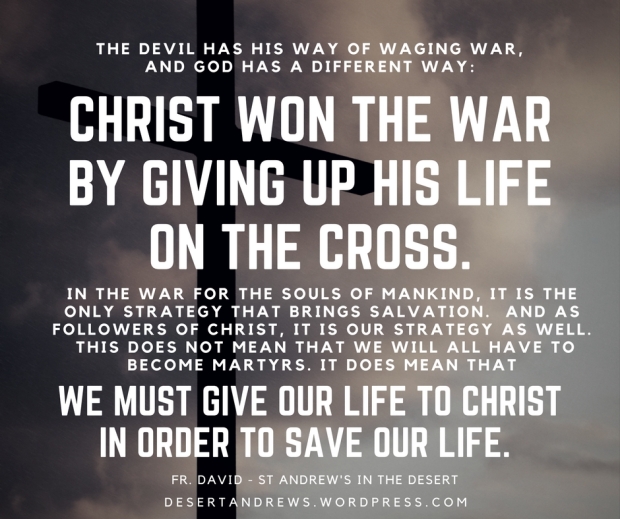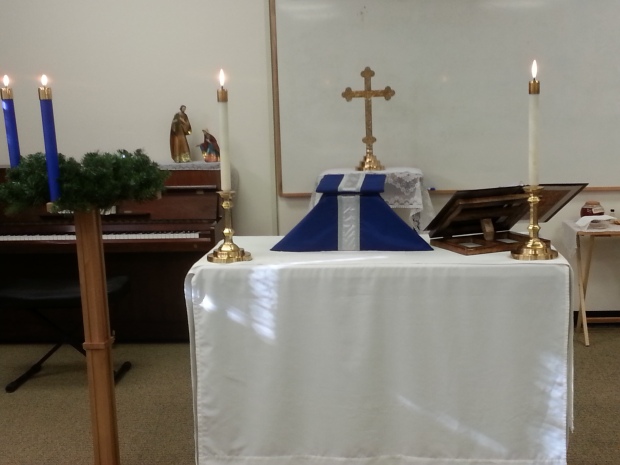“Let me sing for my beloved my love song concerning his vineyard: My beloved had a vineyard on a very fertile hill. He dug it and cleared it of stones, and planted it with choice vines; he built a watchtower in the midst of it, and hewed out a wine vat in it; and he looked for it to yield grapes, but it yielded wild grapes.”
Isaiah, inspired by the Holy Spirit, speaks of singing a song. This passage is known as the Song of the Vineyard. But this is not a well known hymn sung by a graduating elementary student. This is a love song sung by God to his chosen people. This is a sad song, for it speaks of unrequited love. Much of the prophesy in Isaiah is in poetical form, this passage is no exception. So the words are very well fitted to be song lyrics. Three of the Canticles in the Book of Common Prayer, which are songs, come from other passages in Isaiah. So Isaiah is very well suited to be put to music. In a similar manner the psalms were written to be sung. They are the hymnal of the Old Testament. That is why we chant the psalms. This morning’s psalm is similar in some ways to our poetical passage from Isaiah. Both use images of grapes and grapevines. This is continued in our gospel reading. Grapes, being an important crop in Israel, are an often used as images throughout the Bible.
Both of these passages are very lovely, and were probably even more so in the original Hebrew. But there is a contrast in the view of the psalmist and that of God spoken through Isaiah. In verses 12 and 13 the psalmist claims that God has abandoned them: “Why hast thou broken down her hedge, that all they who go by pluck off her grapes? The wild boar of the wood doth root it up and the wild beasts of the field devour it.” Often times we feel that God has abandoned us. The only way to get past that feeling is to deal with it honestly. Psalms like this can be very helpful in doing just that. The psalmist them pleads for reconciliation: “Turn thee again, thou God of hosts, look down from heaven; behold and visit this vine.”
But God, speaking through Isaiah, says that the real problem is that the people have not been faithful to the covenant he made with them. In the psalm the people cry, “Behold and visit this vine.” In Isaiah, God asks: “What more was there to do for my vineyard, that I have not done in it? When I looked for it to yield grapes, why did it yield wild grapes?” It is the people’s unfaithfulness that is the problem; it is not that God has forgotten them. He will never forget, for he always longs to come to the aid of those who call upon him and are willing to follow in his ways.
In our reading from Matthew, Jesus tells a parable based on Isaiah’s Song of the Vineyard from our Old Testament reading. It begins with very similar wording about setting up a grape vineyard. In Isaiah, the leaders of Israel who fail to follow God are represented by the wild grapes, which are no good, when it should have yielded good grapes. But Jesus switches the imagery to make the unfaithful leaders the tenants who refuse to give the owner (God) his share of the harvest. This allows Jesus to add the element of the prophets represented by the servants who are sent to collect God’s share of the harvest. More importantly, it adds the element of Jesus himself as the son who is killed by the wicked tenants.
This parable follows right after the parable we heard last week. Both parables are said in response to the chief priests and elders who confront Jesus in the temple during Holy Week and question his authority. Even more than last week’s parable, this parable illustrates how the leaders of Israel have misused their authority in the past and continue to do so. Only now their crimes have escalated. Throughout the history of Israel the leaders of the country mistreated and even killed the prophets sent by God as his servants. Now they are rejecting God’s own Son and in a few days they will see to it that he is crucified. Because God spoke through the prophets and told the people things they did not want to hear, they would not accept the authority of the prophets. For the same reason, they refuse to accept the authority of Jesus.
In the parable, the wicked tenants think that if they kill the son, they will inherit the vineyard. In those days, it was common, when there was no heir, to give the property to those who occupied it. But the tenants are forgetting about the owner of the vineyard just as the leaders of Israel have forgotten about God. Of course they still attend to their ritualistic duties and no doubt they made a great show of praying to God. But they have lost touch with God, and so do not recognize his Son when he comes. It is folly for the tenants to think they will gain the vineyard by killing the owner’s son. It is folly for the leaders of Israel to think they can go on with business as usual while rejecting God’s Son.
And so Jesus concludes the parable with a question: When therefore the owner of the vineyard comes, what will he do to those tenants?” And the unfaithful leaders respond with the only logical answer: “He will put those wretches to a miserable death, and let out the vineyard to other tenants who will give him the fruits in their seasons.”
Their own words have condemned them, but apparently they can’t quite see it due to their arrogant pride. So Jesus makes it clear to them by quoting Psalm 118: “Have you never read in the Scriptures: ‘The stone that the builders rejected has become the cornerstone; this was the Lord’s doing, and it is marvelous in our eyes.’” This verse comes from the building of the temple. The cornerstone was sent from quarry to the building site. The builders couldn’t see what it was for at that point, so they set it aside. They when they were ready for the cornerstone, they sent a messenger to the quarry to send it over. The message came back that they had already sent it. Then they had to make a search and find where they had put the stone that they thought did not fit. Jesus then tells them what the parable and this verse from psalm 118 means in terms of them personally: “Therefore I tell you, the kingdom of God will be taken away from you and given to a people producing its fruits.”
What a hard sentence they have brought upon themselves. As rulers of God’s chosen people they have major responsibilities. When they refuse to accept the authority of God’s own Son, they are abdicating themselves of this responsibility. Israel was God’s chosen people, and they still are in many ways. They are the people to whom God first revealed himself. They are the people through whom salvation was brought into the world. They still have a special relationship with him. But when they failed to accept his Son, they lost the kingdom of God. It was taken from them as Jesus said. Of course many Jews, thousands in fact, became believers in Christ. But the nation as a whole, lead by these unfaithful leaders, would not accept him, and suffered the consequences. In the year 70, Jerusalem was destroyed by the Romans and the temple was torn down.
The vineyards has been given to us as followers of Christ. So we come out the big winners in this parable. But remember this is true only as long as we do not make the same mistakes as the wicked tenants. In the parable, the tenants looked wicked indeed, and so they are. But in real life, they seemed to be holy men even though they were not. So we must be careful not to make the same mistakes as the unfaithful leaders of Israel. As long as we continue to work in God’s vineyard, and give him the first fruits, we will have a place in the kingdom of God. Paul writes about this in his letter to the Romans. If you read the book of Acts, you discover that on his missionary journeys, Paul would always go to the synagogue first, if he could find one, to proclaim the gospel. He was appointed by Christ as Apostle to the Gentiles, but he was also called to preach to the “sons of Israel.” So he always went to the synagogue which was the most likely place to find those Gentiles who were interested in the one true God. He generally got a very favorably response from the Gentiles he found there. But the response from the Jews was rather mixed. Many of them became believers, but many more did not, and some of those who did not stirred up trouble for him.
And when you read Romans you discover the deep pain that Paul feels because so many of his fellow Jews reject Christ. And he hopes that someday this may change. We too should have that same hope for our Jewish brothers and sisters. And Paul, like our psalm and our reading from Isaiah and Jesus’ parable in Matthew, uses an agricultural image to get his point across. Only instead of grapes, he uses another major crop of Israel – olives. And he refers to Gentile followers of Christ – that’s you and me – as wild olive branches grafted into the tree whose roots reach as deep as Abraham and whose trunk is Christ Jesus.
And he writes this: “Now I am speaking to you Gentiles [that’s us]. Inasmuch then as I am an apostle to the Gentiles, I magnify my ministry in order to make my fellow Jews jealous, and thus save some of them. For if their rejection means the reconciliation of the world, what will their acceptance mean but life from the dead? If the dough offered as first fruits is holy, so is the whole lump; and if the root is holy, so are the branches.”
Paul was not willing to give up on the salvation of his people, and neither is God. But for the unfaithful leaders of Israel, the parable of the wicked tenants spells out their destruction. But for us, this parable is one of great promise and tremendous responsibility. The kingdom of God is ours for the asking. All we must do is be faithful tenants and give God his share of the harvest. Now that’s a deal! So let our song not be like the psalm that wonders why God does not act. And let us not give God cause to sing a lament because of our unfaithfulness as he does in Isaiah. But let us sing songs of joy and thankfulness for the gracious gift our loving God bestows upon us. The heart of the message in our psalm is not verses 13 and 13 but 7 and 19 which both say: “Turn US again, Lord God of host show the light of thy countenance, and we shall be whole.”







